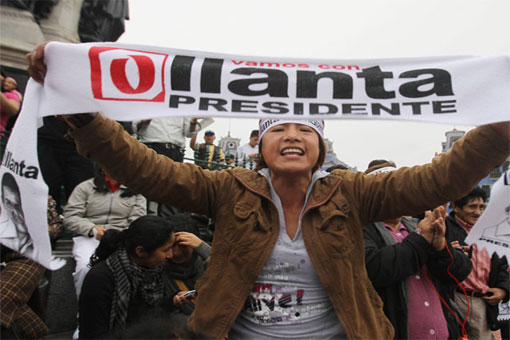Ollanta Humala’s 2.95 percentage point win in Peru’s presidential election on June 5 triggered the local stock index’s biggest crash ever and sent some middle-class families in Lima, haunted by the ghosts of hyperinflation and past economic calamity, running to supermarkets to stock up on basic supplies.
But the IGRA index recovered the 12.5 percent it lost on Monday almost immediately and stability and calm have since prevailed in Lima.
Upon winning, Humala offered an olive branch to the country with calls for reconciliation after what had been a long and bitterly divisive campaign.
“We have won the presidency of Peru, and we will build a government of national consensus,” he announced in Lima’s historic Plaza dos de Mayo shortly after claiming a narrow but decisive victory over Keiko Fujimori.
President-elect Humala now appears more like a relaxed father than the aggressive former army officer seen in the 2006 campaign. This change in image came partly as a result of intensive coaching on the campaign trail as well as a change in rhetoric. After his victory, he later reaffirmed with several international news agencies that he would not follow the model of his former political mentor, Venezuelan President Hugo Chávez, and reiterated promises to manage the economy prudently.
Instead, in visiting Brazil as part of a victory lap around the Southern Cone, Humala said he wants to “use Brazil as an example which has already had plenty of success.” He went on to praise Latin America’s top economy for reducing poverty, developing a vibrant domestic market and maintaining growth—a sharp contrast from the ever more isolated Venezuela.
That was a big relief for the local and international business community, which had widely suspected Humala’s transformation from fiery revolutionary to moderate leftist was merely a ploy to gain votes.
In the past week, all three major rating agencies said Humala’s win would not affect Peru’s healthy economic fundamentals or put its investment grade credit rating at risk. That cheered local traders, spurring a rebound in financial markets.
And on June 9, cell phone provider Claro announced a $1 billion investment in Peru over three years—the first post-election promise from a foreign company and a nod of approval to the new government from the world’s richest man and the region’s most imminent capitalist, Carlos Slim. (Claro is a unit of America Movil, the Mexican billionaire’s flagship.)
Humala says he does not plan to impose any new taxes on companies, aside from a tax on the windfall profits of the vast mining sector, which would only kick in when metals prices are fetching higher prices on international markets. Fujimori also supported the tax. But Humala, in yet another peace offering to the private sector, told Reuters on June 7 that he planned to negotiate the tax rate with mining firms, taking their profit margins into account.
Some still have doubts and question if the president elect could have really abandoned his original campaign platform, which called for a new constitution that would permit greater state control in key industries and the renegotiation of mining contracts and free-trade agreements. “That vagueness is likely to take its toll on the demand for investment, both domestic and foreign,” wrote analysts from Deutsche Bank in a report that predicted a trend of slower economic growth in Peru. For such doubters, the key test will be if Humala, who has never had elected office, appoints experienced moderates to key cabinet positions.
The Humala Cabinet
The guessing game is now underway of who will be his top advisors especially in key portfolios with economic oversight. Investors are hoping he will name Kurt Burneo as finance minister. Burneo is an economics professor at San Ignacio de Loyola and worked in former President Alejandro Toledo’s government. Another option is Felix Jimenez, the architect of Humala’s original government plan, who may raise jitters in the financial community.
Clad in his now trademark suit, Humala has he would consider renaming the widely respected Julio Velarde to head the Central Bank, though Oscar Dancourt, another Toledo administration alum, is a name that is also commonly mentioned.
With financial markets appeased for the time being, Humala may be in no hurry to make appointments, which he can do up until he assumes office on July 28. But in one of his first Twitter messages as president elect, Humala (@Ollanta_HumalaT) addressed some likely candidates for those positions thanking the “intellectuals and independent personalities” that had helped him revise and moderate his campaign platform.
Those “personalities” include Nobel Prize winning novelist Mario Vargas Llosa and former President Toledo, who, after losing in the first round vote on April 10, sent technocrats from his Perú Posible party to assist Humala’s campaign.
In the run-off vote’s tight finish, their support weighed on the moral conscience of moderate voters like Egidio Auccahuaque, the founder of a robotics technology company in Lima. He, like many others, warmed to Humala’s new image after rejecting Fujimori’s ties to her father, former President Alberto Fujimori, now in jail for corruption and human rights abuse. “For me it was a terrible headache deciding,” said Auccahuaque, at a Humala victory rally. “But Peru isn’t just Lima—I know there is a lot of wealth in this country, and we need to do something to distribute it, responsibly of course.”
Humala’s top challenge on taking office will be to balance his election promises of alleviating poverty with new social programs with the need to continue reassuring the financial community so private investment keeps flowing in. And with 48.5 percent of voters choosing his opponent, he will also have to win over these skeptical Peruvians. In Congress, even if every member of Toledo’s party supports his initiatives, Humala’s party, Gana Perú, will remain in the minority in the new, fractured Congress.
If he can pull it off, Humala will have created a model for a new, responsible leftist ideology in what has long been a society divided on class and racial lines.




